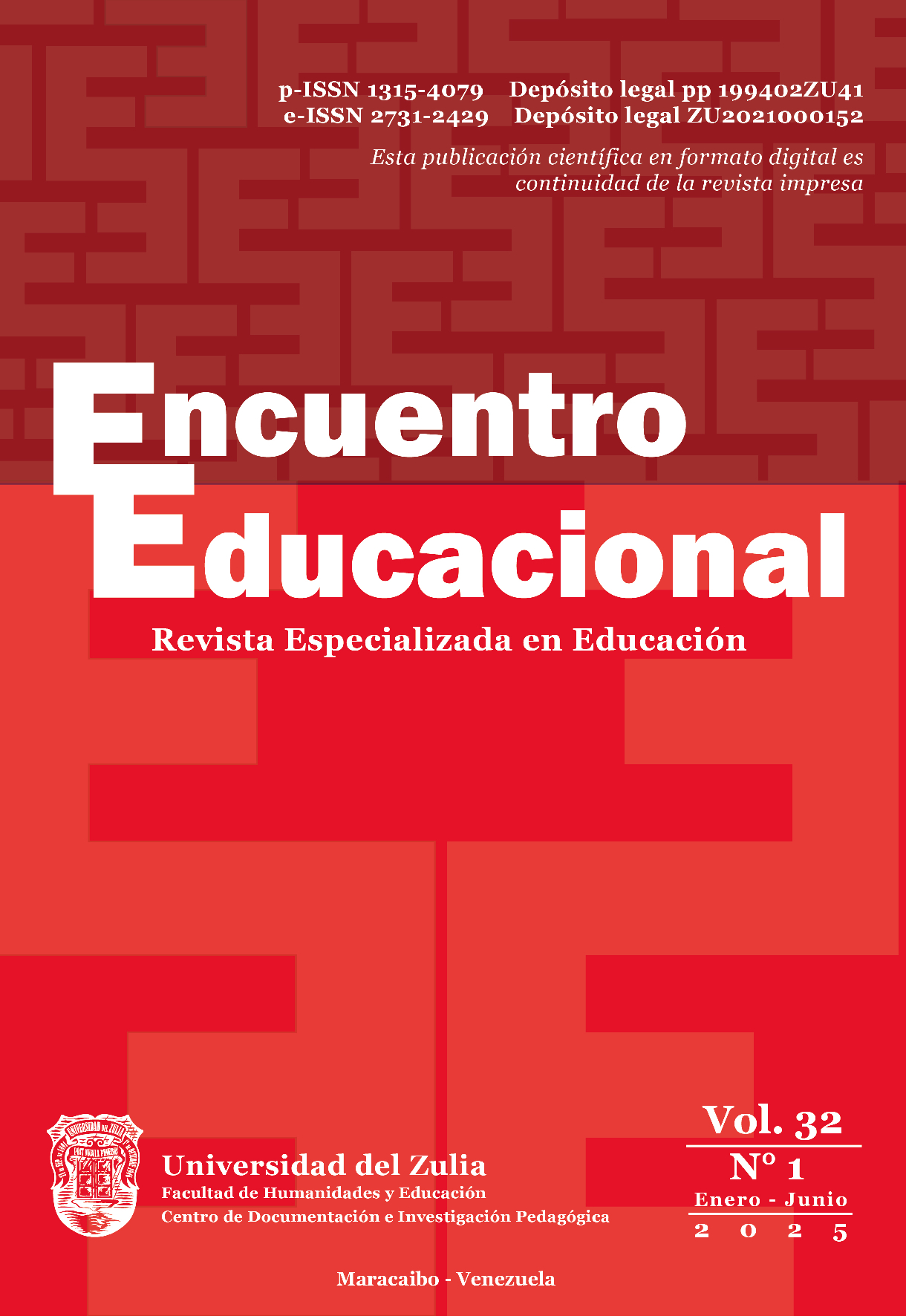Proyecto Ambiental Escolar: Retos, Avances y Oportunidades para su Resignificación desde una Perspectiva Sistémica e Interdisciplinaria
School Environmental Project: Challenges, Progress and Opportunities for its Redefinition from a Systemic and Interdisciplinary Perspective
Abstract
The current environmental crisis demands a profound transformation in the way we conceive and approach environmental education. In this context, the reinterpretation of concepts and approaches associated with this subject arises as a necessity to respond to the socio-environmental challenges of the 21st century. The purpose of this research is to identify challenges, progress and opportunities for the redefinition of the school environmental project from a systemic and interdisciplinary perspective, at the Manuel Ruiz Álvarez Educational Institution in Montería, Colombia. The study was framed within an interpretive paradigm, with a qualitative approach, documentary design and descriptive scope. Six documents were analyzed: (1) Sustainable Development Goals, (2) National Policy on Environmental Education, (3) Curricular Guidelines of the Ministry of Education, Colombia, (4) Decree incorporating the School Environmental Project (5) Guidelines for the formulation of Projects and (6) School Environmental Project of the educational institution. The documentary analysis revealed that, although regulations promote a systemic and inclusive vision, the current implementation of the School Environmental Project at the institution is partial. The conclusion is highlighted as needing to redefine the educational process to achieve greater integration with the Institutional Educational Project. The project is proposed to be built in three phases: planning and design (participatory assessment and macro-project design), implementation (training, concrete actions, and monitoring), and sustainability (inter-institutional coordination, updating, and communication).
Downloads
References
Bohórquez, C. (2018). Didáctica centrada en procesos de formación e investigación en organizaciones educativas; una propuesta para formar la sociedad del conocimiento. Revista de Educación Humanidades y Ciencias REDHECS, 26(13), 182–197. https://ojs.urbe.edu/index.php/redhecs/article/view/1302
Bohórquez, C. (2022). Modelo de desarrollo humano ecológico sustentable para entes territoriales: Consideraciones filosóficas, teóricas y metodológicas para lograr la triple vertiente de la sustentabilidad (1ª ed.). Fondo Editorial URBE. https://www.researchgate.net/publication/367076656_MODELO_DE_DESARROLLO_HUMANO_ECOLOGICO_SUSTENTABLE_PARA_ENTES_TERRITORIALES
Díaz-Barriga, F., & Hernández, G. (2010). Estrategias docentes para un aprendizaje significativo: Una interpretación constructivista (3ª ed.). McGraw Hill Interamericana.
Flórez Restrepo, G. (2012). La educación ambiental: Una apuesta hacia la integración escuela-comunidad. Praxis & Saber, 3(5), 79–101. https://revistas.uptc.edu.co/index.php/praxis_saber/article/view/1135
Flórez Restrepo, G. (2013). La dimensión ambiental en los escenarios escolares. Educación y Ciencia, (16), 129–146. https://revistas.uptc.edu.co/index.php/educacion_y_ciencia/article/view/3248/2922
García Donato, A. (2022). Resignificación de la educación ambiental en la educación secundaria, desde el pensamiento de la tierra. CIEG. Revista Arbitrada del Centro de Investigación y Estudios Gerenciales, (56), 84–96. https://revista.grupocieg.org/wp-content/uploads/2022/06/Ed.5684-96-Garcia-Donato.pdf
Institución Educativa Manuel Ruiz Álvarez, Montería, Colombia. (2018). Proyecto Ambiental Escolar.
Leff, E. (2004). Racionalidad ambiental. La reapropiación social de la naturaleza. Siglo XXI. https://ru.iis.sociales.unam.mx/bitstream/IIS/4937/1/Racionalidad_ambiental.pdf
Mendoza Alba, C. (2021). Resignificación del Proyecto Ambiental Escolar: Una construcción con la comunidad educativa del municipio de Chitaraque [Trabajo de maestría, Universidad Pedagógica y Tecnológica de Colombia]. https://repositorio.uptc.edu.co/server/api/core/bitstreams/4cfb2e08-f19a-43ac-95de-692b55de6c57/content
Ministerio de Ambiente, Ministerio de Educación Nacional, Colombia. (1994). Decreto Presidencial 1743, 3 de agosto de 1994. https://www.funcionpublica.gov.co/eva/gestornormativo/norma.php?i=1301
Ministerio de Ambiente y Desarrollo Sostenible, Ministerio de Educación Nacional, MEN, Colombia. (2002). Política Nacional de Educación Ambiental. https://observatoriomesoamerica.minambiente.gov.co/obsmesoamerica/medios/Colombia/POLITICA%20EDUCACION%20AMBIENTAL.pdf
Morín, E. (2009). Introducción al pensamiento complejo. Gedisa.
Organización de las Naciones Unidas para la Educación, la Ciencia y la Cultura, UNESCO. (2020). Educación para el desarrollo sostenible: Hoja de ruta. https://unesdoc.unesco.org/ark:/48223/pf0000374896
Peñata Luna, U., & Cuellar López, Z. (2022). La educación ambiental en Colombia: Avances, logros, retos y perspectivas para la consolidación de una cultura ecológica. Encuentro Educacional, 29(1), 28–50. https://www.produccioncientificaluz.org/index.php/encuentro/article/view/38590
Pulido Orozco, A. (2020). Resignificación del proyecto ambiental escolar PRAE en la Institución Educativa Luis Flórez, Sede Principal, Corregimiento Tierra-Dentro, Municipio Líbano Tolima. En B. Pupiales (Ed.), Boletín Actas Pedagógicas. Grupo de Investigación Edu-Física (Vol. III, pp. 247–257). Universidad del Tolima. http://fce.ut.edu.co/images/servicios/grupos_inv/BolActas_Pedagogicas_Vol.III-0323.pdf#page=252
Ramírez, M., Velásquez, Y., & Crump, M. (2023). La educación popular ambiental: Una experiencia en la comunidad de Guayacán, Guantánamo. ECOVIDA, 13(2), 81–89. https://dialnet.unirioja.es/servlet/articulo?codigo=9435623
Solórzano Herrera, S. (2016). Las representaciones de los estudiantes en la resignificación del Proyecto Ambiental Escolar (PRAE): Hacia la construcción de una conciencia ambiental [Trabajo de maestría, Universidad Militar Nueva Granada]. https://repository.umng.edu.co/items/c9492dee-94a0-4a92-bfeb-b544ff1abb72
Valero, M., & Febres, M. (2019). Educación ambiental y educación para la sostenibilidad: Historia, fundamentos y tendencias. Encuentros, 17(2), 24–45. http://ojs.uac.edu.co/index.php/encuentros/article/view/661
Vélez Taborda, L. (2019). Propuesta para el alcance de la resignificación del Proyecto Ambiental Escolar articulado al Proyecto Educativo Institucional en el Colegio Santa Ana de Los Caballeros, Municipio de Ansermanuevo, Valle del Cauca [Trabajo de pregrado, Universidad Tecnológica de Pereira]. https://repositorio.utp.edu.co/server/api/core/bitstreams/1adf0b25-79f3-4cd0-9851-311ed4b84e21/content
Von Bertalanffy, L. (1989). Teoría general de los sistemas (7ª reimpresión). Fondo de Cultura Económica.


















